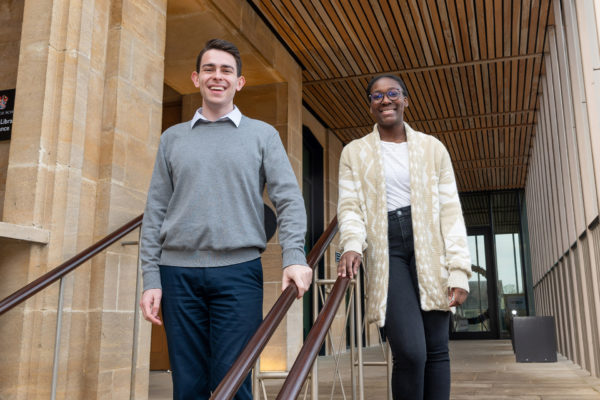EdTech & AI In Education
By
1 year ago

Nathaniel McCullagh, Managing Director at Simply Learning Tuition, discusses how AI and Edtech could change the education system.

Nathaniel McCullagh, Managing Director at Simply Learning Tuition
In an age where artificial intelligence (AI) is rapidly reshaping our world, how should our educational system use AI to evolve? And what do we want this evolution to look like?
For me, progress would lead to greater equality of access to skilled educators who can provide emotional, academic and moral guidance to their students. These are the tools we all need to succeed in life. Can AI help achieve this evolution? It may make the dissemination of facts faster and cheaper but how will it change children’s motivation and the essence of their learning? Most agree that we need to strike a careful balance between technological advancements and the nurturing of inherently human qualities.
Only a few quiet voices seem to be calling for a reality check, a pause to challenge the seemingly ubiquitous love affair with AI and ask, ‘do our children really need this?’.
EdTech, the umbrella term for educational technology, encompasses a wide range of tools and applications that claim to enhance the learning experience. From automated grading systems to personalised learning platforms, it has infiltrated many areas of education, promising to provide a more effective learning environment. Artificial Intelligence takes things a step further, with AI powered tutors like Elon Musk’s ‘Synthesis’ (created by his son’s maths teacher) and Sal Khan’s, Khanmigo. These are marketed as a transformative force that will revolutionise the way that students learn.
The benefits of AI
Many educators embrace the way products like Chat GPT can enhance the way we create standardised texts such as training manuals and lesson plans. It can also generate surprisingly good ideas. But it this going to lead us to genuine progress in education? EdTech alone cannot solve the inherent problems of an underfunded education system that suffers from a critical shortage of teachers, unhelpful political manipulation and unprecedented competition for our students’ attention from social media. Addressing these challenges head on is where our focus should be.
Fans of Ed Tech believe that it will free teachers from the tyranny of marking, lesson planning and the requirement to know their subjects inside out; as a result teachers will have more time to focus on human interaction with their students. I fear that it will have the opposite effect.
Good teachers will be driven from the classroom as their autonomy disappears and their role becomes secondary to the dictates of an impersonal machine.
Who is in charge?
AI should be used to enhance, not supplant, human interaction and the natural process of learning. But who will make sure that is does? The key regulators of the aggressive commercialisation of the education space are school leaders and teachers. They must tread carefully. Naturally creative and forward thinking (and with a keen eye on parental demands) they need to play a critical role in limiting the inappropriate use of AI-driven tools, ensuring that they align with pedagogical principles and promote genuine understanding and creativity.
The vital human touch
As a private tutor, every student I worked with needed emotional support as much as they needed the answers to the next test. I do not believe there should be separation between a child’s emotional development and their education. Growing up is tough and children spend more time with their teachers than their parents.
On the subject of pastoral care, I was shocked by a recent visit to a popular international school outside London.
If a member of staff sees a student who they suspect to be unhappy, or who looks anxious, they press an alert on their smartphone.
If sufficient alerts are received, the system triggers an intervention – the student is asked (by the system) if they would like to attend a counselling session. This system lacks the warmth and intuition of human care. It exemplifies a broader trend where technology is encroaching on areas traditionally governed by human empathy and understanding. Software developers can afford to hide behind screens. Pastoral care cannot.
What is telling about the parents who actively reject EdTech?
In 2023 Simply Learning Tuition has been approached by several families eager to create bespoke home school programmes along the lines of Charlotte Mason’s ideal of a liberal education. These parents wanted to ban the use of screens and they insisted on pen to paper teaching. They wanted at least half the teaching to take place outside the classroom. Can you guess the unexpected common denominator? All of these parents made their fortunes in EdTech. (Incidentally, Steve Jobs didn’t allow his children to use an iPad at home).
What of the future?
“The skills that will define success in the future are profoundly human: creativity, empathy, teamwork and critical thinking.”
(2023 Goldman Sachs survey of 10,000 Small and Medium sized UK businesses)
These are not just buzzwords; they are the core competencies that differentiate humans from machines. These skills don’t emanate from machine learning algorithms; they are forged through real-world experiences, challenges, and often, through failure. They are more crucial than subject knowledge.
Teachers must not become mere co-pilots to AI but should remain firmly in control of the learning process. I’m not sure this is possible if we continue our unquestioning acceptance of AI. Instead, we need to shift our focus towards fixing the undervalued profession of teaching, not watching from the sidelines at it is supplanted by AI. If we get it right, education can evolve to help us become better human beings.
Want to know more?
Nathaniel McCullagh, will be joined on a webinar by an expert panel of leaders in education, including Headmistress of Cameron Vale School, Alison Melrose, to discuss the opportunities and challenges presented by this new technology. The webinar is on Thursday 8 February at 10am. You can sign up on the form.






